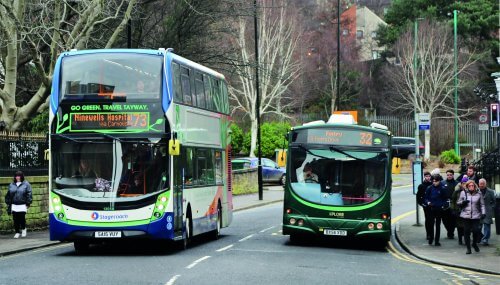Scottish operators will move to a new Network Support Grant scheme aimed at aiding recovery from pandemic from 1 April.
The Scottish Government is to introduce a new grant to help maintain bus services while passenger numbers recover from the effects of the pandemic. From 1 April, the discretionary Network Support Grant (NSG) will replace the Covid Support Grant, Covid Support Grant – Restart, and the Bus Service Operators Grant, all of which will cease on 31 March. The new grant aims to secure services as part of wider improvements aimed at attracting passengers back over the longer term, including bus priority, ticketing and better data.
The draft Scottish Budget for 2022-23 provides up to £93.5 million for this grant, including £40 million in additional funding to support recovery. Minister for Transport Jenny Gilruth said: “As we continue to navigate our way through and out of the pandemic, it’s important that the support we give transport operators adapts and evolves, to make sure it remains fit for purpose and represents value for money.
“The Network Support Grant will provide more flexibility than the emergency Covid funding schemes, meaning services can adapt to changed travel patterns. It will be available on the same terms to new as well as established operators to improve efficiencies and the offer to passengers across Scotland. The level of support can be adjusted as passenger numbers recover, ensuring that it is financially sustainable and helping services to adapt to new travel patterns and demand as we emerge from the pandemic.”
Operators who wish to receive four-weekly payments from 1 April are required to submit the required forms, available via the Scottish Government website, by 14 February. Operators applying after 14 February will be brought onto the scheme at the next possible payment date.
Separate payment arrangements and timings will apply for community transport organisations possessing a section 19 or section 22 permit.
NSG will initially be provided through two sub-schemes: NSG, and NSG Plus, which the Scottish Government says will ensure that operators receive the support appropriate to them. NSG and NSG Plus are separate schemes, and operators can only be signed up to one scheme at a time, but may switch between schemes if they meet the relevant terms and conditions. The National Concessionary Travel Scheme for Older and Disabled People, and the Young Persons’ Free Bus Travel Scheme for under 22s will continue to operate as normal.
Outline Terms and Conditions
NSG will be paid at 14.4 pence per kilometre, and is intended to contribute to the costs of running services. Outline terms and conditions include:
- Provision of forecast service kilometres for the relevant financial year to Transport Scotland;
- A commitment to consult with relevant local transport authorities on timetabling, paying special attention to services which may support children to travel to school and that are required to minimise public transport connectivity disadvantages;
- A commitment to respond positively and quickly to reasonable requests from local transport authorities to amend service patterns, schedules, vehicles used or levels of provision in line with public health guidance in relation to Covid-19, and;
- A commitment to communicate changes in a timely fashion.
NSG Plus will be paid at 79.4 pence per kilometre. This rate is intended to help offset lost revenue while patronage recovers from the effects of the Covid-19 pandemic and will be subject to review and adjustment as patronage and revenue recovers in 2022-23. In recognition of the higher level of funding, NSG Plus will have additional terms and conditions, including:
- Notification to Transport Scotland of significant reductions to service kilometres, causing them to drop below 90% of their level on the Estimate Claim Form, or of service frequency reduction of 10% or more in a service that was every 30 minutes or less frequent to a particularly locality compared to the local bus services operated when the operator signed up to NSG Plus.


